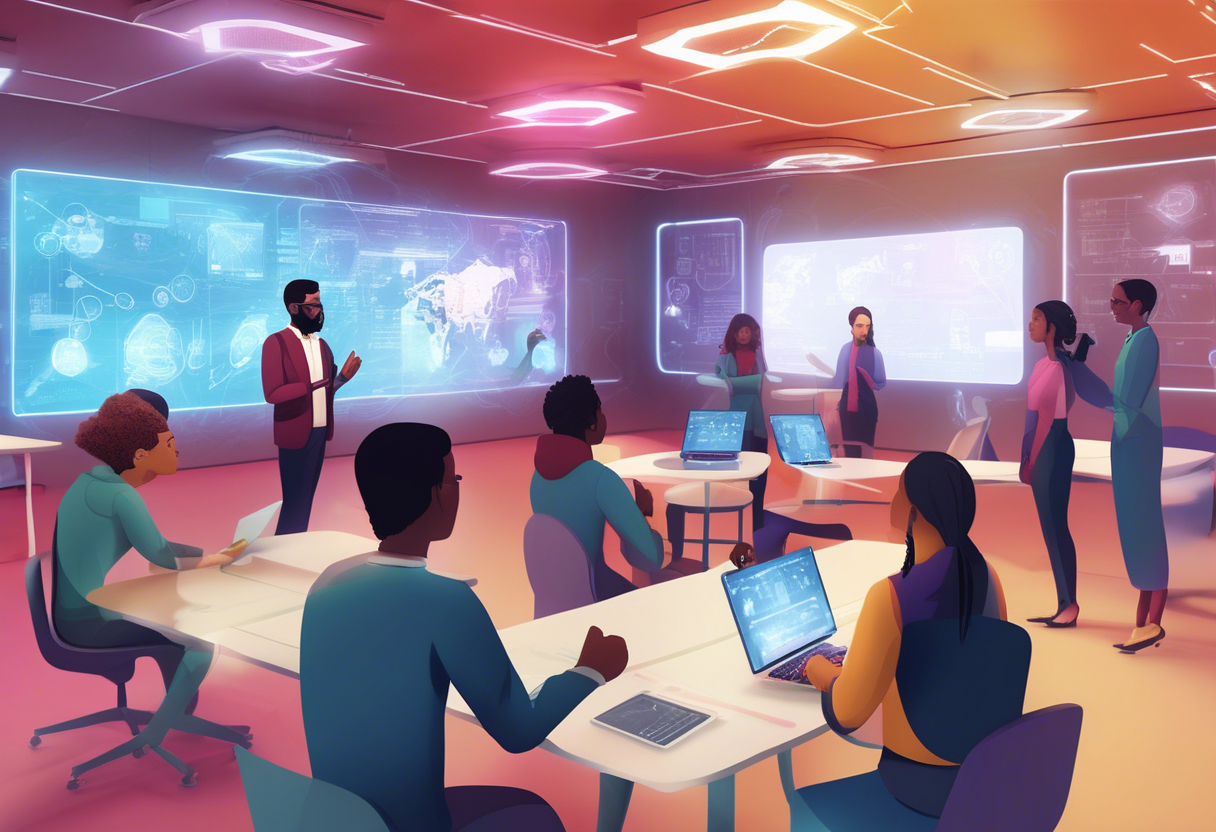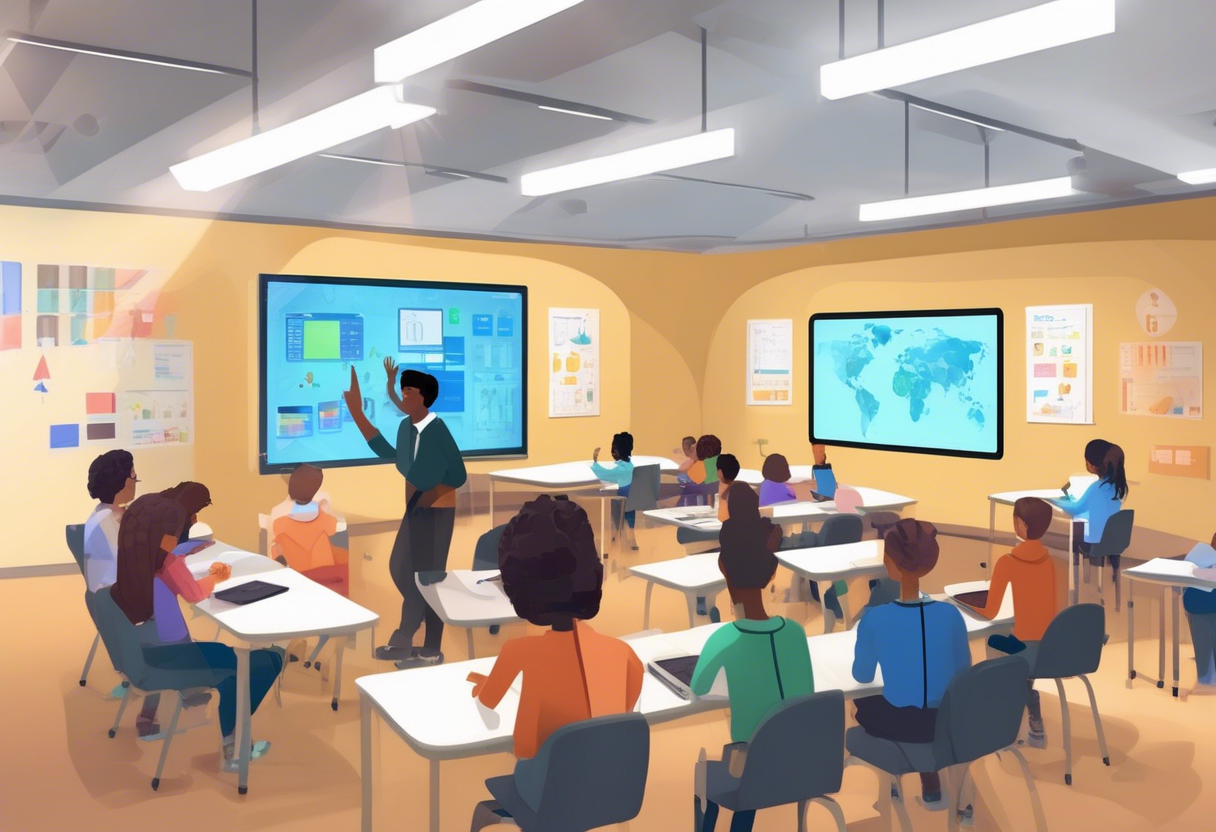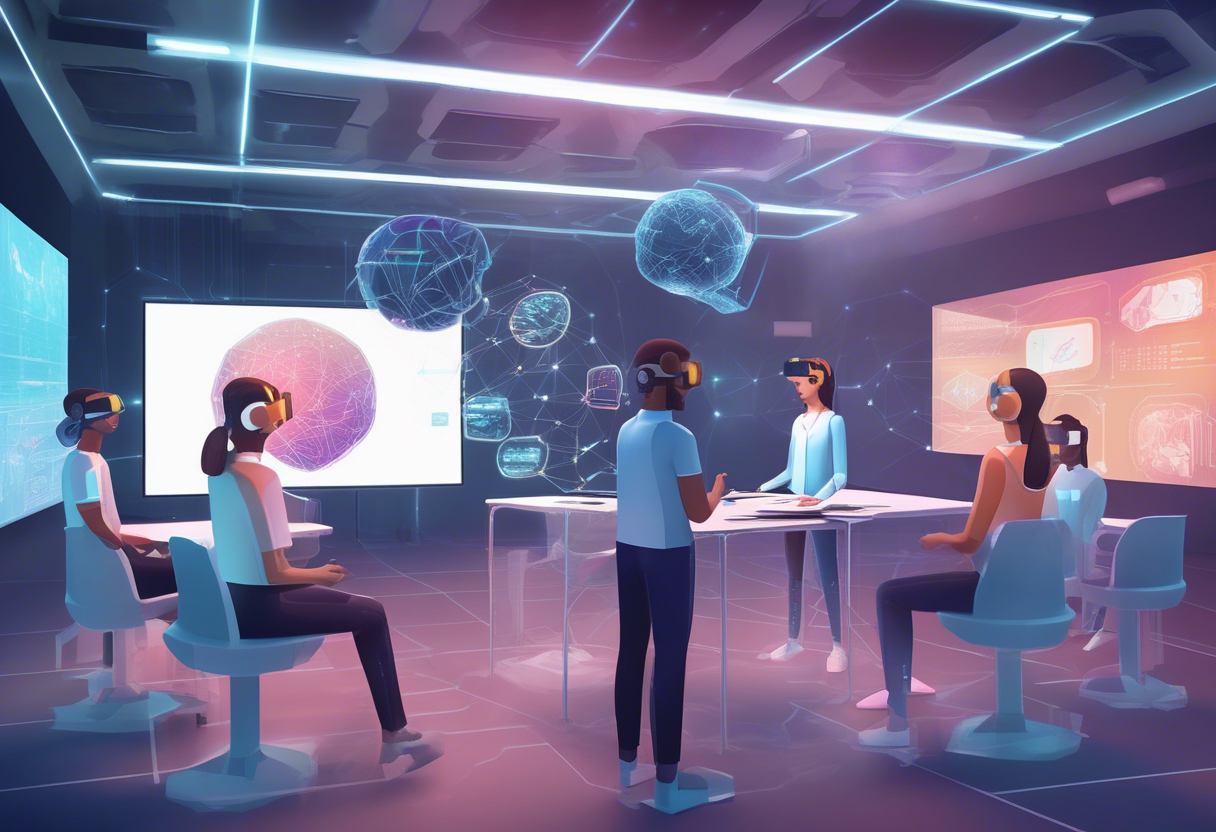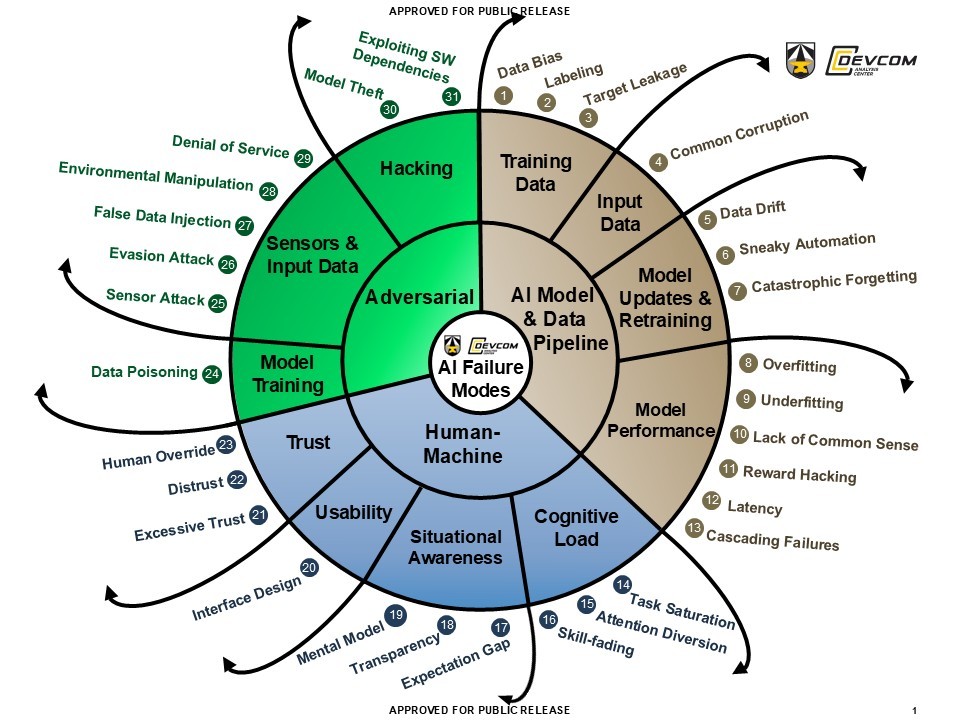
Technology is changing fast, and while keeping up with technical skills is crucial, soft skills are just as important. In fact, 92% of executives believe soft skills matter as much or even more than technical ones. As we look towards 2025, using AI for soft skills training isn't just a future idea—it's happening right now. Picture improving your communication, leadership, and emotional intelligence with AI's personalized, data-driven insights. It's not just about catching up; it's about staying ahead. Let's explore AI-enhanced soft skills training together, from how it works to real-world uses and future trends. Whether you're a seasoned pro or just starting out, this journey can give you the tools you need to succeed in a changing job market.
AI-Powered Training for Soft Skills Enhancement
AI-Powered Training: A New Approach to Soft Skills
AI-powered training leverages cutting-edge technology, such as artificial intelligence (AI) and virtual reality (VR), to craft realistic scenarios. This innovative approach allows individuals to practice essential soft skills, including:
- Communication
- Empathy
- Leadership
- Teamwork
- Negotiation
One of the standout features of AI-powered training is the provision of instant, personalized feedback, which enhances the learning experience by making it more engaging and effective.
Furthermore, AI democratizes the creation and distribution of high-quality training programs, enabling anyone—not just experts—to develop and share these programs swiftly.
Platforms like Articulate 360 facilitate the authoring and delivery of courses across various devices. They utilize AI-generated images and immersive media to enrich the learning journey. When AI is combined with VR, it offers hands-on learning that boosts confidence and real-world skills, particularly for students preparing to enter the job market.
Future of Soft Skills: Why 2025 is Pivotal
By 2025, soft skills such as communication, empathy, leadership, and problem-solving will remain pivotal to business success. With 91% of learning and development leaders emphasizing their importance, these skills are indispensable for effective teamwork and career advancement in today's digital workplace.
AI-powered training meets the growing demand for scalable and effective soft skills development.
However, it is crucial to consider the ethical implications of AI to prevent bias and ensure alignment with human values. Companies are investing heavily in AI-enhanced programs to prepare employees for the complex interpersonal challenges that arise in hybrid and remote work environments.
Step-by-Step Guide to Using AI-Powered Training for Soft Skills
Identify Key Soft Skills for Development
To maximize the benefits of AI-powered training for soft skills, start by identifying which skills need enhancement. Focus on key soft skills such as:
- Communication
- Empathy
- Leadership
- Problem-solving
- Adaptability
- Stress management
- Conflict resolution
These skills are crucial for team and organizational success and often require a personal touch to develop. For example, a company might target communication and empathy for customer-facing roles to enhance client interactions. By understanding which skills are in high demand, organizations can tailor their training programs to address the most critical areas.

Utilize AI Tools to Assess Skill Levels
Utilizing AI to assess current skill levels provides a clear understanding of employee capabilities. AI-driven assessments can simulate real conversations and scenarios, offering a novel approach to evaluating soft skills. These tools create immersive environments where employee responses are measured to identify skill gaps. For instance, AI avatars in virtual role-play can effectively assess an employee's conflict resolution skills, pinpointing areas for improvement. This data-driven approach makes training more focused and efficient.
Develop Personalized AI Training Paths
AI facilitates the creation of personalized learning paths by adapting scenarios and content to each learner’s needs and progress. This tailored approach enhances engagement and accelerates skill acquisition compared to generic programs. For example, an employee struggling with leadership skills can receive targeted modules focused on decision-making and team management. By customizing the learning experience, AI ensures employees are neither overwhelmed nor under-challenged, fostering ownership and continuous development.
Engage in AI-Driven Role-Playing Scenarios
Incorporating AI-powered role-playing into training allows employees to practice soft skills in a safe environment. AI simulations can mimic real interactions, enabling learners to work on communication and empathy without real-world risks. These 3D simulations engage learners by providing lifelike scenarios that adapt to their responses. For example, practicing challenging customer service conversations with an AI avatar that reacts to the learner’s tone and language can significantly improve retention and build confidence.

Benefit from Immediate AI Feedback
A major advantage of AI in training is the instant feedback it provides. AI systems deliver quick, relevant feedback on communication styles, tone, and decision-making, helping learners improve immediately. This immediate feedback allows learners to adjust strategies swiftly, reinforcing good habits and correcting mistakes promptly. For instance, after a simulated negotiation, AI can highlight areas where the learner could be more empathetic and suggest alternative phrasing, enabling rapid adjustments and learning.
Iterate Training with AI Analytics Insights
AI analytics are crucial for refining training programs. By tracking progress, engagement, and outcomes, AI can identify persistent skill gaps and help refine training content and methods. Data-driven insights enable trainers to personalize future sessions and concentrate on areas needing the most attention. For example, AI reports might prompt a trainer to emphasize conflict management after identifying common challenges. Regular updates ensure the program remains effective and aligned with organizational goals.
Set Goals and Foster Self-Advocacy in Training
Setting specific, measurable goals for soft skills development enhances motivation and focus. These goals should align with individual career aspirations and organizational objectives. Encouraging learners to advocate for their growth promotes accountability and engagement in the training process. For instance, learners can set personal targets in communication and review progress with AI-generated reports. This self-advocacy is crucial for successful soft skills growth, empowering employees to be active in their development.
Combine AI Training with Human Interaction
While AI offers valuable insights and personalized learning paths, it's important to blend AI training with human interaction for a richer learning experience. AI should complement, not replace, human-led training to maintain ethical standards and uphold human values in soft skills development. Combining AI tools with instructor-led sessions and peer collaboration ensures balanced and effective learning. Human coaches can interpret AI feedback and provide emotional support and context. For instance, after AI simulations, learners can join group discussions led by a coach to deepen understanding and share insights.
Ensure AI Tools Use Diverse Data Sets
Ensuring AI tools are built on diverse and inclusive data sets is crucial to avoid reinforcing biases in training scenarios. Ethical AI deployment respects human values and promotes fairness across all learner demographics. By training AI with diverse data, organizations can ensure AI avatars represent various backgrounds and communication styles, reflecting real-world diversity. This inclusivity fosters an equitable learning environment that supports everyone's growth.
Regularly Update AI Training Programs
Regularly reviewing and updating AI training content is necessary to keep up with changing workplace needs and technologies. Regular reviews help incorporate learner feedback, new research, and improvements in AI capabilities. For instance, quarterly updates to training modules based on the latest industry trends and AI performance metrics can keep the program current. By staying informed about emerging trends in soft skills and technology, organizations can maintain a dynamic training environment that evolves with workforce needs.
Identify Soft Skills Gaps with AI
Identifying soft skills gaps within an organization is vital for designing an effective training program. AI-powered assessments can simulate real-life challenges and measure responses, providing a data-driven method to identify areas needing attention. Since soft skills gaps are often subtle, personalized evaluation is necessary. For example, using AI to detect hesitation or ineffective communication during virtual role-plays can provide valuable insights for targeted interventions.
Choose Effective AI Tools for Soft Skills
Choosing the right AI tools is key to successful soft skills enhancement. Select tools that offer immersive, adaptive learning experiences with integrated analytics and feedback. These tools should align with organizational goals and support ethical, unbiased training practices. For example, selecting an AI platform that integrates with existing learning systems and supports diverse scenario creation can ensure a seamless and impactful training experience.
Optimize Learning Paths with AI Personalization
AI tailors content and difficulty based on learner progress, optimizing engagement and outcomes. Personalization boosts training effectiveness by addressing individual strengths and weaknesses. For instance, an AI system can adjust scenario complexity as the learner masters each soft skill. This customization enhances engagement and motivation, empowering employees to take charge of their development and achieve meaningful growth.
Implement AI-Driven Training Programs Successfully
Successfully implementing AI-powered training programs involves combining AI simulations with human coaching and clear training objectives. Integration with existing learning systems enhances accessibility and tracking. For example, launching a blended program where AI provides scenario practice and trainers facilitate reflective sessions can ensure a smooth transition and high participation levels. Communicating the objectives, benefits, and expectations to all stakeholders is crucial for a successful rollout.
Monitor Progress with AI Analytics
Continuous monitoring and evaluation of the soft skills training program using AI analytics are essential for assessing its effectiveness. AI analytics provide continuous tracking of learner engagement and skill development. Regular evaluation using AI data helps adjust training to maximize effectiveness and learner satisfaction. For example, using dashboards to track improvements in communication skills and adapting training content accordingly ensures the program stays aligned with organizational goals and delivers results.
In conclusion, AI-powered training for soft skills offers a comprehensive way to enhance essential workplace competencies. By leveraging AI's capabilities in assessment, personalization, and feedback, organizations can create effective, engaging, and inclusive training programs that empower employees to develop critical soft skills.
AI-Enhanced Soft Skills Training: Real-World Examples
AI-Driven Soft Skills Training in Various Industries
AI is revolutionizing the training of soft skills across various sectors. Consider Hyperspace, which employs AI-driven 3D simulations to aid companies in enhancing employees' communication, problem-solving, and adaptability skills. These simulations integrate seamlessly with Learning Management Systems (LMS), providing feedback and assessments.

Another example is Didask, which simplifies the creation of personalized training for non-experts, offering instant feedback. Additionally, AI tools like ChatGPT are effective in improving communication and interpersonal skills through role-playing and real-time feedback.
These AI platforms enable industries to simulate real-world scenarios such as conflict resolution and negotiation, thereby enhancing employee performance.
Best Practices for AI-Enhanced Soft Skills Training
AI significantly enhances soft skills training by complementing, not replacing, human interaction. As Scott Provence highlights, AI simulations offer realistic practice and immediate feedback, which keeps learners engaged and aids in better retention.

Key best practices include:
- Diverse Data Usage: Ensures training is equitable and free from bias.
- Content Creation: AI facilitates faster development of high-quality training programs, as exemplified by Didask.
- Real-time Feedback: Allows learners to adjust their communication in real-time, accelerating skill acquisition and boosting confidence.
By integrating these practices, organizations can effectively leverage AI to enhance soft skills training.
Future Trends in AI and Soft Skills Development
Soft Skills Demand Beyond 2025
As the workplace continues to evolve, the importance of soft skills is increasingly recognized. Skills such as critical thinking, emotional intelligence, and empathy distinguish humans from machines, especially in an era where AI is rapidly advancing. Despite the growth of AI, over 85% of young professionals believe that soft skills are more crucial for long-term success than merely having technical expertise.
Professionals who can blend technical knowledge with human skills, such as problem-solving and teamwork, are in high demand. By 2025, learning trends emphasize the necessity of skills like collaboration and critical thinking as automation reshapes job roles. Companies are increasingly focusing on developing these soft skills, alongside initiatives like AI-driven learning, personalized learning, and microlearning.
Enhancing Soft Skills with AI Collaboration
AI tools are transforming workplace learning by offering personalized feedback and adapting to individual learning preferences, effectively acting as on-demand coaches. These AI platforms can construct skills maps for organizations, aligning skills with job requirements and identifying gaps to create personalized career paths.
To effectively collaborate with AI, it is essential to refine soft skills such as trust and communication. The future of workplace training includes AI tutors that assist with real-time problem-solving, enhancing human-AI teamwork.

FAQs on AI-Powered Soft Skills Training
Enhancing Emotional Intelligence with AI-Powered Training
AI-powered training can significantly boost emotional intelligence by providing personalized feedback and guidance. This approach makes empathy training more accessible and effective. Through realistic conversation simulations, AI enables you to practice and improve your communication and empathy skills in real-time.

These 3D simulations create immersive learning experiences that enhance your ability to remember and apply what you've learned with greater confidence. Interactive scenarios and virtual mentoring, powered by AI, offer tailored emotional intelligence training that can be quickly deployed and scaled.
For instance, a company might utilize AI-driven 3D simulations with virtual avatars to train employees on empathy and communication, offering instant feedback on their responses and gestures.
Top AI Tools for Soft Skills Training in 2025
By 2025, several AI tools are expected to lead in soft skills training:
- Large Language Models (LLMs): Simulate realistic conversations for practice and feedback.
- Learning Management Systems like Didask: Facilitate the creation of personalized, interactive training without requiring teaching expertise.
- Platforms such as Hyperspace: Offer AI-powered 3D simulations with features like AI avatars and gesture adaptation, integrated with LMS for assessments.
- Open eLMS AI: Provides tools to instantly create multimodal eLearning courses with interactive scenarios and real-time feedback.
AI and Human Skills: A Powerful Workplace Synergy
AI and human skills complement each other by enhancing both data-driven feedback and human empathy. AI enhances human soft skills by adding personalized insights to traditional learning methods. While AI provides scalable, engaging, and accessible training solutions, humans contribute empathy, judgment, and contextual understanding.

The combination of AI's immersive simulations and human facilitation fosters effective learning environments that improve soft skills retention and application. This synergy ensures that AI supports rather than replaces human interaction, maintaining ethical standards and avoiding bias in the workplace.